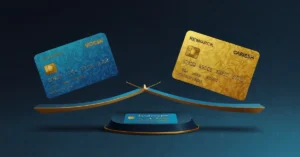Rewards vs Cash Back Credit Cards are among the most popular choices in 2025 for U.S. consumers. Credit cards have become more than just payment tools — they’re gateways to savings, perks, and lifestyle benefits. Both reward-based and cash-back options offer valuable returns on spending, but in different ways.
If you’ve ever wondered whether rewards or cash back cards give better value, you’re not alone. The answer depends on your spending habits, travel goals, and financial preferences. This guide breaks down how each card type works, their pros and cons, and how to decide which one truly wins for you.
Understanding Rewards vs Cash Back Credit Cards
Rewards credit cards allow you to earn points or miles for every dollar you spend. These rewards can be redeemed for travel, hotel stays, gift cards, or even merchandise.
Most rewards cards are linked to major airline or hotel programs or flexible points systems such as Chase Ultimate Rewards or American Express Membership Rewards.
How They Work
When you use a rewards card, you typically earn between 1x to 5x points per dollar depending on the category (like dining, travel, or groceries). For example:Rewards vs Cash Back Credit Cards.
- The Chase Sapphire Preferred® Card offers 2x points on travel and dining.
- The American Express® Gold Card gives 4x points at restaurants and supermarkets.
Pros of Rewards Credit Cards
- ✈️ Ideal for Travelers – Get free flights, hotel stays, and upgrades.
- 🎁 Flexible Redemption – Use points for travel, gift cards, or statement credits.
- 💰 High Value Potential – When optimized, 1 point can be worth up to 2–3 cents.
- 💎 Extra Perks – Travel insurance, lounge access, and purchase protection.
Cons of Rewards Credit Cards
- 🔄 Complex Redemption Systems – Points may lose value if not used strategically.
- 💸 Annual Fees – Premium cards often come with annual fees between $95 and $550.
- 🧾 Limited Cash Value – Points aren’t always equal to real cash.
Rewards cards are best suited for people who travel frequently, plan strategically, and can take full advantage of loyalty programs.
What Are Cash Back Credit Cards?
Cash back cards are the simplest way to earn from your spending. Instead of points or miles, you earn a fixed percentage of your purchases back as cash — usually between 1% and 5%.
This makes them perfect for anyone who prefers straightforward savings without worrying about redemption rules.Rewards vs Cash Back Credit Cards.
How They Work
Rewards vs Cash Back Credit Cards Every time you make a purchase, a portion is returned to you as cash or statement credit.
For example:
- The Citi® Double Cash Card gives 2% back on all purchases (1% when you buy + 1% when you pay).
- The Discover it® Cash Back Card offers 5% back on rotating categories like gas, groceries, and online shopping.
Pros of Cash Back Credit Cards
- 💵 Simple and Direct – No need to track points or miles.
- 🏦 Flexible Redemption – Receive as statement credit, bank deposit, or check.
- 📈 No Annual Fee (Mostly) – Many cash back cards have $0 annual fees.
- 🎯 Predictable Earnings – Know exactly what you’re getting each time you spend.
Cons of Cash Back Credit Cards
- 📉 Lower Potential Value – Maximum return usually capped at 5%.
- 🔒 Limited Perks – Fewer travel benefits and purchase protections.
- ⚙️ Category Restrictions – Some cards rotate bonus categories quarterly.
Cash back cards are ideal for individuals who value simplicity, consistency, and savings on everyday purchases.Rewards vs Cash Back Credit Cards
Rewards vs Cash Back Credit Cards: Side-by-Side Comparison
| Feature | Rewards Credit Card | Cash Back Credit Card |
| Type of Return | Points or Miles | Cash or Statement Credit |
| Best For | Frequent travelers, planners | Everyday spenders |
| Earning Rate | 1–5x points per $ | 1–5% cash back |
| Flexibility | Travel, gifts, transfers | Direct cash value |
| Complexity | Moderate to High | Simple and Transparent |
| Annual Fees | Often $95–$550 | Usually $0–$95 |
| Potential Value | Up to 3%+ (with transfers) | 1–2% on average |
| Perks | Travel insurance, lounge access | Straightforward savings |
| Best Example | Chase Sapphire Preferred® | Citi® Double Cash Card |
This table makes it clear: rewards cards offer more upside, but cash back cards deliver steady, no-hassle value.
Which Type of Card Suits You Best?
The right choice depends on your lifestyle and spending behavior. Let’s see which type fits different kinds of users.
1. Frequent Travelers
If you travel multiple times a year, a rewards card is unbeatable. You’ll get free flights, hotel upgrades, and bonus miles.
👉 Best Pick: Chase Sapphire Preferred® or Capital One Venture Rewards®.
2. Everyday Spenders
If your spending is mainly on groceries, gas, and utilities, a cash back card offers more predictable savings.
👉 Best Pick: Citi® Double Cash or Wells Fargo Active Cash®.
3. Students and Beginners
Students new to credit can start with a no-annual-fee cash back card. It helps build credit while earning small rewards.
👉 Best Pick: Discover it® Student Cash Back.
4. High Spenders
Those with large monthly expenses can combine both types — one rewards card for travel and one cash back card for daily purchases.
👉 Best Combo: Chase Freedom Flex® + Chase Sapphire Preferred®.
How to Maximize Your Credit Card Value
No matter which card you choose, smart usage can amplify your returns:Rewards vs Cash Back Credit Cards

- 💡 Pair Cards Strategically – Use one for cash back on groceries and another for travel points.
- 🕒 Track Bonus Categories – Quarterly cash back offers can add up quickly.
- 💳 Redeem Wisely – Travel redemptions often offer more value than gift cards.
- 📆 Pay Balances in Full – Avoid interest charges that cancel out your rewards.
- 🧾 Leverage Sign-Up Bonuses – Many cards offer $200–$500 bonuses for hitting spending thresholds.
By following these strategies, your card can work for you instead of costing you.Rewards vs Cash Back Credit Cards.
2025 Trends: Hybrid Rewards + Cash Back Cards
Credit card issuers in 2025 are introducing hybrid models that combine both rewards and cash back benefits.
For example:
- The Chase Freedom Flex® offers 5% cash back in rotating categories but also lets you transfer points to travel partners via Chase Ultimate Rewards.
- The Capital One SavorOne® Card offers 3% on dining and entertainment while redeeming rewards as either cash or travel miles.
These cards bridge the gap between flexibility and simplicity — offering the best of both worlds.Rewards vs Cash Back Credit Cards.
Common Mistakes to Avoid
Even savvy users can make missteps that reduce their card’s value. Avoid these traps:
- ❌ Ignoring Annual Fees – A $95 fee can offset cash back if you spend too little.
- ⚠️ Redeeming Poorly – Using points for low-value gift cards reduces ROI.
- 💳 Overspending for Rewards – Rewards never justify debt.
- 🕓 Forgetting Expiration Dates – Some points expire if inactive.
- 🧠 Ignoring Bonus Categories – Missing 5% categories means losing easy earnings.
By Rewards vs Cash Back Credit Cards staying mindful, you’ll ensure your rewards genuinely benefit your finances.
Expert Recommendation on Rewards vs Cash Back Credit Cards
So, which credit card wins?
The answer isn’t one-size-fits-all — it depends on your spending style and goals.
- Choose Cash Back if you want simplicity, steady savings, and no annual fees.
- Choose Rewards if you value travel perks, flexibility, and higher potential returns.
- Choose Both if you want to maximize total value — using cash back for daily purchases and rewards for travel or luxury spending.
Ultimately, the real winner is the one that aligns with your financial habits and helps you spend smartly.Rewards vs Cash Back Credit Cards.
Conclusion
The battle of Rewards vs Cash Back isn’t about which card is better overall — it’s about which one is better for you. Cash back cards deliver instant, predictable savings, while rewards cards open doors to exciting travel opportunities and higher returns when managed well.
Both Rewards vs Cash Back Credit Cards can help you save more if used smartly. earning cash back for essentials and points for experiences. Whether you’re just starting out or optimizing a multi-card setup, the key is to spend wisely, pay responsibly, and redeem strategically.
Your credit card isn’t just a payment tool — it’s a personal finance weapon. Use it wisely, and let every swipe work for your financial freedom.Rewards vs Cash Back Credit Cards.
FAQs
Q1: What’s better for beginners — cash back or rewards cards?
Cash back cards are better for beginners because they’re simple, easy to manage, and usually have no annual fees.
Q2: Are rewards cards only useful for travelers?
Not always. Some rewards cards allow redemptions for gift cards, merchandise, or statement credits — not just travel.
Q3: Can I switch from a cash back card to a rewards card later?
Yes. Many banks allow product changes after 12 months of responsible use.
Q4: Do rewards points expire?
It depends on the issuer. Points from programs like Chase or Amex usually don’t expire as long as your account remains open.
Q5: How much cash back is considered good?
A flat 2% cash back is excellent for general spending. Anything above that in bonus categories is a great deal.
